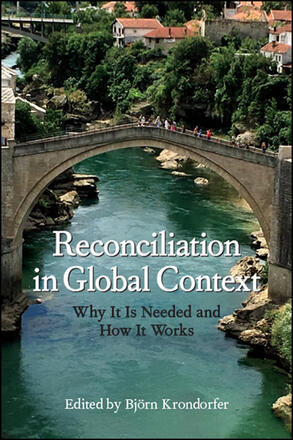
Reconciliation in Global Context
Why It Is Needed and How It Works
Alternative formats available from:
Open access edition available from:
A transdisciplinary approach to reconciliation practices and policies by an international team of scholars and scholar-practitioners.
Description
When we open the newspaper, watch and listen to the news, or follow social media, we are inundated with reports on old and fresh conflict zones around the world. Less apparent, perhaps, are the many attempts at bringing former adversaries together. Reconciliation in Global Context argues for the merit of reconciliation and for the need of global conversations around this topic. The contributing scholars and scholar-practitioners—who hail from the United States, South Africa, Ireland, Israel, Zimbabwe, Germany, Palestine, Belgium, Bosnia and Herzegovina, Serbia, Switzerland, and the Netherlands—describe and analyze examples of reconciliatory practices in different national and political environments. Drawing on direct experiences with reconciliation efforts, from facilitating psychosocial intergroup workshops to critically evaluating official policies, they also reflect on the personal motivations that guide them in this field of engagement. Arranged along an arc that spans from cases describing and interpreting actual processes with groups in conflict to cases in which the conceptual merits and constraints of reconciliation are brought to the fore, the chapters ask hard questions, but also argue for a relational approach to reconciliatory practices. For, in the end, what is important is to embrace a spirit of reconciliation that avoids self-interested action and, instead, advances other-directed care.
This book is freely available in an open access edition thanks to Knowledge Unlatched—an initiative that provides libraries and institutions with a centralized platform to support OA collections and from leading publishing houses and OA initiatives. Learn more at the Knowledge Unlatched website at: https://www.knowledgeunlatched.org/, and access the book online at the SUNY Open Access Repository at http://hdl.handle.net/20.500.12648/7139
.
Björn Krondorfer is Director of the Martin-Springer Institute and Endowed Professor of Religious Studies at Northern Arizona University. He is the author of Male Confessions: Intimate Revelations and the Religious Imagination.
Reviews
"This is simply the finest collection of essays on reconciliation processes working at the grassroots and mid-levels of societies I have ever seen. It takes up important issues and moves the discussion forward in each instance." — Robert J. Schreiter, author of Constructing Local Theologies